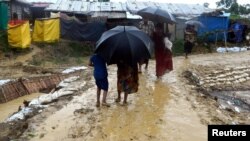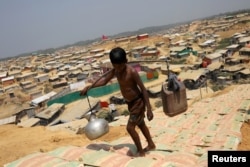In commemoration of Wednesday's World Refugee Day, human rights group Amnesty International called for the international community to provide aid for more than 900,000 Rohingya refugees in Bangladesh, amid fear of environmental disaster, gender-based violence, and potential human trafficking in their camps.
According to the United Nations, 200,000 of the refugees are "at risk of landslides and floods during the current monsoon season," which already has damaged over 3,000 shelters.
The Rohingya are a predominantly Muslim ethnic group who have lived in the Southeast Asian nation of Myanmar for centuries. Yet the nation does not recognize the Rohingya as citizens, instead regarding them as illegal Bengali immigrants from the time of British colonial rule of the nation. A 1982 law codified that status within Myanmar — rendering the country's thousands of Rohingya essentially stateless.
In 2017 alone, more than 600,000 Rohingya fled the country due to violence against them by the Myanmar militia, prompting the United Nations and world leaders such as British Prime Minister Theresa May and then-U.S. Secretary of State Rex Tillerson to denounce the country as partaking in "ethnic cleansing."
"Until they can return to Myanmar without the risk of serious human rights violations, the refugee response will have to shift from one that has been near-exclusively focused on a humanitarian crisis response to one that meets the refugees' needs for protection," according to a statement by Amnesty International.
Many Rohingya have fled to neighboring Bangladesh. Nearly a million Rohingya have settled in Bangladesh's Cox's Bazar district — a coastal region that is among the most susceptible to monsoons in the low-lying country.
The sudden surge of refugees has proved difficult to handle for Bangladesh, already among the world's most densely-populated nations. According to Amnesty International, the government of Bangladesh has restricted the building of permanent, more stable refugee settlements; in January, Prime Minister Sheikh Hasina called for the quick repatriation of Rohingya.
While the international community has provided aid to the refugees, advocacy groups are saying it's not enough.
Omar Waraich, deputy South Asia Director for Amnesty International, told VOA's Burmese Service that only 20 percent of the U.N.'s international request for aid so far has reached the refugees — and the organization already has received reports of possible human trafficking and gender-based violence in the Cox's Bazar camp.
And while many of the refugees have expressed a desire to return to their home in Myanmar's Rakhine state, the fear of possible human rights violations is too great for them to go back, according to Amnesty International.
"This is not a crisis that is going to disappear anytime soon," Amnesty International South Asia Director Biraj Patnaik said in a statement. "We need to confront the fact that the Rohingya may have to remain in Bangladesh for years to come. The international community has a duty to support these victims of the most horrific human rights violations accordingly, and not wait until further disasters visit them before taking action."







